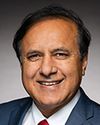Good morning, everyone.
I call the meeting to order.
Welcome to meeting number nine of the House of Commons Standing Committee on Citizenship and Immigration.
Members and witnesses may speak in the official language of their choice. Interpretation services are available for this meeting. You have the choice at the bottom of your screen of either floor, English or French audio. If interpretation is lost, please inform me immediately and we will ensure interpretation is properly restored before resuming the proceedings. The “raise hand” feature at the bottom of the screen can be used at any time if you wish to speak or alert the chair.
Today, we will be considering the supplementary estimates (C) for the year 2021-22.
On behalf of the committee members, I would like to welcome the Honourable Sean Fraser, Minister of Immigration, Refugees and Citizenship, as well as officials from the IRCC.
We are joined today by Madam Catrina Tapley, deputy minister; Madam Marian Campbell Jarvis, senior assistant deputy minister, strategic and program policy; Mr. Daniel Mills, senior assistant deputy minister, operations; Madam Jennifer MacIntyre, assistant deputy minister, Afghanistan; and Mr. Hughes St-Pierre, assistant deputy minister, finance, security and administration.
Thank you, Minister, for joining us today. I hope you are feeling well.
Before we go to hearing from the minister, I have just a few comments for the benefit of the witnesses. Before speaking, please wait until I recognize you by name. When you are ready to speak, you can click on the microphone icon to activate your mike. I remind everyone that all comments should be addressed through the Chair. Interpretation in this video conference will work very much as it does in a regular committee meeting. When speaking, please speak slowly and clearly. When you are not speaking, your mike should be on mute.
Witnesses have five minutes for opening remarks. I will be giving you a warning with a one-minute card, a 30-second card, and then a red card showing that the time is up.
With that, I would like to welcome Minister Fraser, who will begin our discussion with five minutes of opening remarks. We will then go into a round of questions.
Thank you, Minister, for appearing before the committee, once again, and I hope you are feeling well. I now turn the floor over to you.













